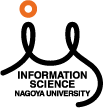Department and Center

The Graduate School of Information Science, in realizing its basic philosophy, has established five master's programs and doctoral programs: Department of Computer Science and Mathematical Informatics, Department of Information Engineering, Department of Media Science, Department of Complex Systems Science and Department of Systems and Social Informatics, in addition to a Center for Embedded Computing Systems.
Department
Department of Computer Science and Mathematical Informatics
Our primary mission is to foster the study and education of theoretical computer science and mathematical informatics. The graduate program is designed to nurture advanced information engineers and researchers capable of developing new aspects of information science. Students will acquire skills to think through the perspective of mathematical science, as well as develop knowledge on computer and information science.
Department of Information Engineering
This department conducts research and education in a wide area of computer system design and development in both hardware and software, with the ultimate aim to improve convenience, safety and comfort in society. Students will explore new frontiers of information engineering over a period of remarkable progress in integrated circuit and information exchange technology. Through research and education on the principles and techniques of information system construction, we aim to nurture individuals with the ability to lead and propel the field of advanced information technology.
Department of Media Science
In this department, we will nurture highly skilled media scientists and engineers through education and research. Programs will be aimed at clarifying cognitive functions of human beings and creation of intelligent machines to process and express media. Fundamentals of media science essential to supporting and developing an IT society is also scope of the program.
Department of Complex Systems Science
The central aim of the department is to contribute to research and education in clarifying the structure and dynamics of information systems across complex natural and artificial systems. Through the studies, the department focuses on innovative development in information technologies, based on the law a self-organization system, to discover new scientific concepts and laws in the information sciences.
Department of Systems and Social Informatics
The ultimate goal is to discover how a better relationship can be built between information communication technol-ogy and society from a broad interdisciplinary standpoint. Emphasis focuses on teamwork when conducting research projects. Team members will have intelligent background in computer science, philosophy and aesthetics. Ongoing research projects are available in subjects such as: support of citizen's activities and cooperation by the eff ective use of network technology, communication betterment that is vital in establishing a healthy society, actualizing better ad-ministrative services, empowerment of local communities using ICT, information design, foundation in informatics from a philosophical perspective, interaction between technology and society, ethics of information processing engineers, and development of an intelligent infrastructure according to each society.
Center
Center for Embedded Computing Systems
Computer systems that are embedded in various devices/machines are called embedded systems. Th ese devices/machines may be a television, cell phone, car, robot, or even airplane. Recently we fi nd that embed-ded systems and their software are getting more complex. Th us, industries confront diffi culty in designing and implementing high-quality, high-performance embedded systems. Th e Center for Embedded Comput-ing Systems (NCES) was established in April 2006 for joint R&D studies by the industry and government.








